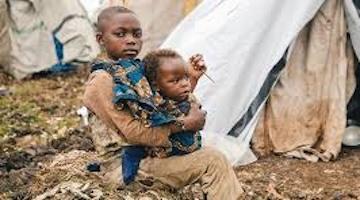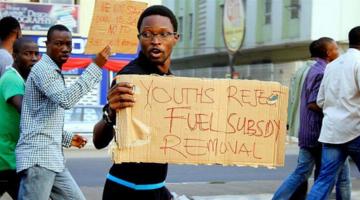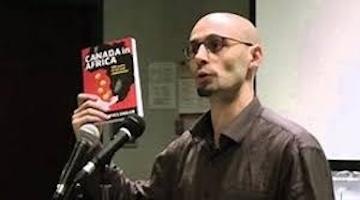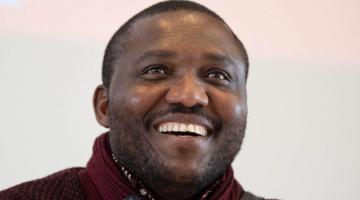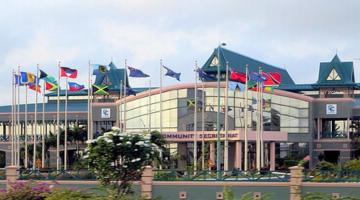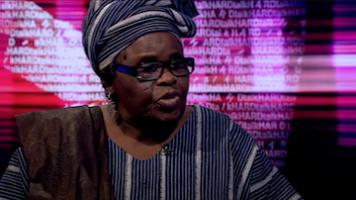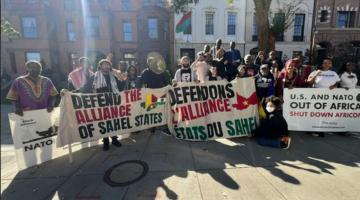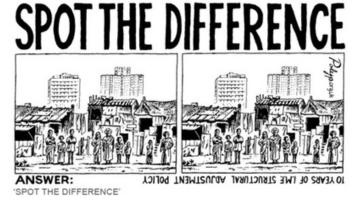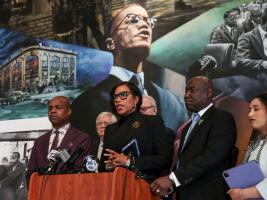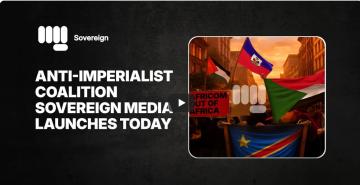Burkina Faso soldiers announce take over of government, January 24, 2022. Image from Blaze Trends.
*This article was originally published in Borkena.
France and the United States interventions have done more to worsen instability in the Sahel and other regions of the continent.
This time lower-ranking army officers staged a mutiny in Burkina Faso over the weekend of January 22-23 leaving millions domestically and throughout the region wondering who was actually in control of the landlocked agricultural country formerly colonized by France.
During the afternoon on January 24, several soldiers appeared on national television saying they had taken control of the government removing President Roche Marc Christian Kabore who was elected during a transitional process in 2015. The deposed president was reportedly being held at a military camp where one of the mutinies occurred.
Other officials including the president of the National Assembly, Allasane Bala Sakande, was also taken into custody by the coup makers. The military officers declared in their television statement announcing the takeover, that the parliament and the Constitution had been suspended while announcing the formation of a Patriotic Movement for Safeguarding and Restoration which would govern the country indefinitely.
Sakande was the leader of the ruling People’s Movement for Progress (MPP) and had been considered as a possible successor to Kabore. The headquarters of the MPP was vandalized and partially burned by supporters of the coup.
Due to the rapidly deteriorating security situation in Burkina Faso, discontent with President Kabore and the military leadership has mounted over the last several years. The attacks by insurgents have spread throughout several West African countries including Nigeria, Cameroun, Niger, Chad and Mali.
Most recently in November, 53 members of the security forces were killed in an ambush carried out by rebels claiming to be allied with al-Qaeda and the so-called Islamic State. Residents of the capital of Ouagadougou were appalled that the military was incapable of defending itself from such armed attacks in rural areas.
Since the seizure of power by the military junta, there have been demonstrations in the capital celebrating the putsch. Similar to developments in Guinea and Mali, widespread unease over the economic and security situations in the Sahel and other geo-political regions have created disillusionment with politicians.
The leader of the coup appears to be Lt. Col. Paul-Henri Damiba, a graduate of the Military College in Paris. In addition, Damiba has participated in numerous training exercises with the United States Africa Command (AFRICOM) which have grown in size and influence in West Africa in recent years.
Between 2010 and 2020, Damiba was involved in the Pentagon-coordinated Flintlock Joint Combined Exchange Training exercises. In 2013, Damiba studied in the U.S. State Department sponsored African Contingency Operations Training and Assistance course. In 2013 and 2014, Damiba attended the Military Intelligence Basic Officer Course for Africa. In 2018 and 2019, he trained in Burkina Faso with a U.S. Defense Department Civil Military Support Element.
The ostensible purpose of these numerous Pentagon training operations is to provide assistance to governments in Africa related to the enhancement of their internal security structures. However, with the advent of AFRICOM beginning in 2008 and the escalation of military officers being trained by the Defense Department both on the continent and in the U.S., the actual security situation in Africa has declined precipitously.
In Mali and Guinea as well, the officers involved in military coups had close ties with the various Pentagon and State Department projects. Even though the rationale for taking power in Mali and now Burkina Faso was that the civilian governments had failed to protect people from the jihadists, yet since the 2012 coup in Mali, the successive military and civilian administrations have not been able to defeat the insurgencies.
Regional and World Leaders Respond to the Coup
A delegation from the regional Economic Community of West African States (ECOWAS) visited Burkina Faso on January 29. Quite similar to the ECOWAS response to events in Mali and Guinea, the regional body has suspended the membership of Burkina Faso and is imposing economic sanctions.
France has also condemned the coup amid rising anti-Paris sentiments throughout the Sahel where the presence of the former colonial power’s military forces has drawn the ire of a broad spectrum of Africans. In the aftermath of the January 24 coup in Burkina Faso, people demonstrating in support of the coup waved Russian flags and called for Moscow to intervene to assist in defending the country against the jihadist rebels.
A report published on the coup by Al Jazeera noted that: “Ghanaian President Nana Addo Dankwa Akufo-Addo, the current ECOWAS chairman, called the recent spate of coups in West Africa ‘a direct violation of our democratic tenets’. The rest of the world is looking up to us to be firm on this matter,’ he said…. Nicolas Haque reporting from Ouagadougou said, ‘The heads of the military in the region will be meeting with the new strongman of this country, Lieutenant-Colonel Paul-Henri Tamiba on Saturday (Jan. 30) to try to apply pressure on him.’… ‘There were words from Niger’s foreign minister. He said: ‘We do not understand that military leaders – after having failed in the field of war – take political power and call on mercenaries to defend the integrity of their territory,’ Haque said. ‘He’s referring to Russian fighters from the Wagner group that are active in neighboring Mali and the Central African Republic.”
Revolutionary Leader of Burkina Faso Was Overthrown in 1987
Much of the turmoil which has gripped this West African country can be traced back decades to the violent removal of the government of Capt. Thomas Sankara who ruled the country from 1983 to 1987. Sankara was overthrown in a coup led by his former close comrade Blaise Compraore, who betrayed the revolution, assassinating Sankara obviously at the behest of neighboring Ivory Coast and France.
Although Capt. Sankara emerged from the ranks of the military in 1983, in the years leading up to his seizure of power, he had studied Marxism and world revolution providing the lower-ranking officer with a perspective aimed at building self-reliance and Pan-African solidarity. During his tenure in office which lasted only four years, substantial reforms were undertaken to develop national industries, universal education and literacy, the greater empowerment of workers, women and youth as well as efforts aimed at building an alliance of African states to refuse payment on the usurious debt owed to the International Monetary Fund (IMF), the World Bank and other western-based financial institutions.
Sankara’s influence was spreading at the time of the coup against his leadership. France was bitterly opposed to his ideological orientation and political work and therefore undoubtedly played a pivotal role in his removal from office and liquidation. The circumstances surrounding his assassination were concealed by the succeeding regime of Blaise Compaore, which remained in office for 27 long years.
Compaore brought Burkina Faso solidly back into the fold of French neo-colonialism and world imperialism. Nonetheless, a scheme to extend his tenure in office during 2014, sparked a nationwide rebellion leading to Compaore fleeing the country to Ivory Coast. A subsequent trial involving 14 defendants, including Compaore, accused of involvement in the coup against Sankara in 1987, is still underway in Ouagadougou. The recent coup against Kabore could very well place a damper if not halt the proceedings.
Ousted President Kabore was elected in multi-party elections during 2015. An attempted coup by loyalists to Compaore failed to halt the transitional process. However, the Kabore administration has been increasingly viewed as weak and inefficient. Yet the spread of several jihadist groups since 2015 illustrates the security vacuum inside the country.
These groups are heavily fractured and have conflicting loyalties to foreign-based organizations operating throughout North and West Africa. Despite the presence of U.S. and French forces in the Sahel and other areas of West Africa under the guise of fighting terrorism, the al-Qaeda and ISIS-linked formations such as Ansar Dine, Boko Haram, Islam State of West Africa, Jama’at Nusrat al-Islam wal Muslimeen, al-Mourabitoun, Ansar-ul-Islam lil-Ichad wal Jihad, among others continue to operate terrorizing local populations.
These insurgency groups often exploit the internal ethnic and sectoral divisions among the people of Burkina Faso along with the poverty and underdevelopment resulting from the legacies of colonialism and neo-colonialism. Many of these jihadist tendencies in Africa and West Asia have been supported by the imperialist countries and their allies in efforts aimed at undermining and removing governments which have resisted many of the policies mandated by the western capitalist states.
In Libya during 2011, a counter-revolution against the government of Col. Muammar Gaddafi was coordinated by the Central Intelligence Agency (CIA), the State Department, the Pentagon and NATO. Numerous NATO countries and their allies armed the jihadist ground forces while an eight-month aerial bombing campaign killed tens of thousands of people and displaced millions.
Since 2011, the instability which was initiated during the war against Libya has spread throughout the Sahel region impacting Mali and other countries. Both Republican and Democratic administrations have pursued a similar policy of imperialist hegemony through economic exploitation and militarism.
The U.S. nor France has the willingness to provide genuine assistance to the African people in their contemporary struggles for economic development and territorial sovereignty. The mass sentiment against Paris and Washington is well-founded. What is needed is revolutionary organization which can bring together the people of the region in a program aimed at continental unity and socialist reconstruction.
Abayomi Azikiwe can be contacted through the Pan African News Wire, which he edits.

